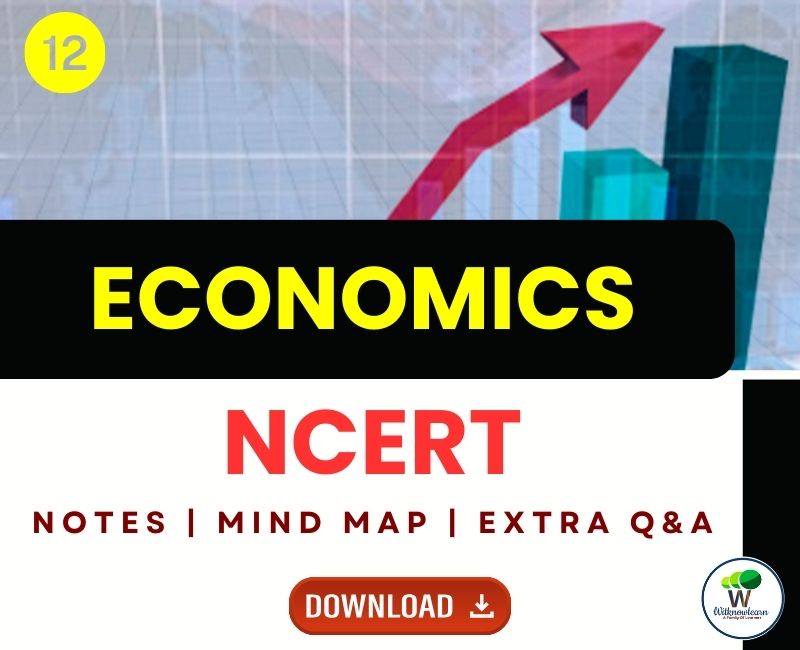Government Budget and the Economy - Notes, Mind map For Class 12
Class 12 Economics Chapter 5, titled "Government Budget and the Economy," is a pivotal part of the Class 12 curriculum, offering students a deep dive into the intricacies of governmental fiscal policies and their impact on the economy. Understanding this chapter is crucial for students as it lays the foundation for comprehending how government budgets are prepared and implemented, and how they influence various economic activities.
Our comprehensive Class 12 Economics Chapter 5 Notes are designed to simplify complex concepts for students. These notes cover everything from the basics of a government budget to its various components and objectives. They are an essential resource for students looking to gain a thorough understanding of the government's role in economic planning and resource allocation.
For visual learners, the Government Budget and the Economy Class 12 Mind Map is an invaluable tool. It breaks down the chapter's concepts into easy-to-understand diagrams, helping students visualize and better retain the information.
Practice makes perfect, and our Government Budget and the Economy Class 12 MCQ section is perfect for students to test their knowledge. These multiple-choice questions cover a wide range of topics within the chapter, providing a comprehensive review and self-assessment tool.
For those seeking a more in-depth study, the Government Budget and the Economy Class 12 Extra Questions offer an additional layer of complexity and challenge. These questions are designed to push students' understanding to a higher level, ensuring a robust grasp of the subject matter.
Moreover, for students and educators who prefer digital resources, our Government Budget and the Economy Class 12 Notes PDF is a convenient option. These downloadable notes provide easy access to vital information, allowing students to study anytime and anywhere.
With a focus on real-world applications, these resources help students understand the significance of governmental budgets in shaping economic policies and their impact on the nation's economy. Whether it's for exam preparation or gaining a deeper understanding of economics, our resources for Class 12 Chapter 5 Economics are tailored to meet the needs of every student.
Objectives of Government Budget
The government budget serves several key objectives essential for a nation's economic stability and growth. Firstly, it aims at resource allocation, where the government decides how to distribute resources across various sectors like defense, education, healthcare, etc., based on societal needs and priorities. Secondly, it focuses on income redistribution, where the government aims to reduce inequalities in wealth and income through progressive taxation and welfare programs. Another objective is economic stability, where the budget is used to control inflation, stimulate economic growth, and regulate business cycles through fiscal policies. Additionally, the government budget aims at promoting economic development by allocating funds for infrastructure, technology, and other long-term investments that fuel economic progress. Lastly, it focuses on efficient public sector management by ensuring optimal use of resources to provide public services effectively.
Classification of Receipts
In government budgeting, receipts are classified into two main categories: Revenue Receipts and Capital Receipts. Revenue Receipts include the earnings that the government receives from tax revenues (like income tax, sales tax) and non-tax revenues (like fees, fines). These receipts are regular and recurring and do not lead to any liability or reduction in assets. On the other hand, Capital Receipts are the funds that the government gets from non-recurring sources, such as loans from foreign governments, disinvestment, or sale of fixed assets. Capital receipts either create liabilities (like loans) or reduce assets (like selling government property). Understanding the classification of receipts is crucial for analyzing the government's fiscal health and policy-making.
Classification of Expenditure
Government expenditure is classified into Revenue Expenditure and Capital Expenditure. Revenue Expenditure refers to the government's spending on day-to-day operations, salaries, subsidies, and interest payments. These expenditures are recurrent and do not result in the creation of assets. In contrast, Capital Expenditure includes spending on the development of infrastructure, healthcare facilities, education, and investments in other long-term assets. Such expenditures are typically one-time investments and contribute to asset creation. The classification helps in understanding how government spending affects the economy's current and future productive capacity.
Balanced, Surplus and Deficit Budget
A government budget can be balanced, surplus, or deficit. A Balanced Budget is where the total revenues equal total expenditures. In a Surplus Budget, revenues exceed expenditures, indicating the government’s financial health. This surplus can be used to pay off debts or for future investments. Conversely, a Deficit Budget occurs when expenditures surpass revenues, indicating that the government needs to borrow funds to meet its expenses. Each type reflects the government's fiscal policy stance and has different implications for the economy.
Measures of Government Deficit
Government deficit is measured in several ways. The Revenue Deficit reflects the shortfall in the government's current revenues compared to its current expenditures, indicating a lack of sufficient revenue to meet operational expenses. Fiscal Deficit is the difference between the total expenditure and total revenue, excluding borrowings, showing how much the government needs to borrow to meet its expenses. Primary Deficit is the fiscal deficit minus interest payments, focusing on the current fiscal position excluding past debts. Understanding these measures is crucial for assessing the government's fiscal health and making informed policy decisions.





